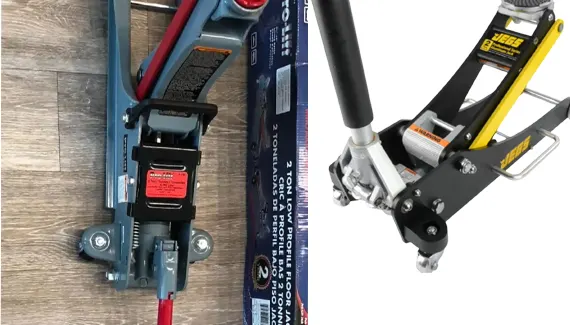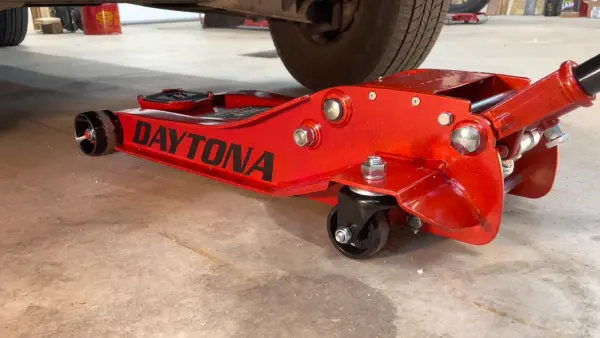Last Updated on April 19, 2023
A low-profile and regular floor jack are two essential tools for car maintenance. When given the option of choosing between these two jacks, which one would you prefer?
These floor jacks have several differences that make them suitable for different types of vehicles and tasks. Low-profile jacks have a lower height and clearance, making them ideal for cars with low ground clearance. Regular jacks have a higher lifting height, making them suitable for larger vehicles and heavier lifting jobs.
Carefully you should also consider lifting capacity and ease of use to balance stability & speed. Not only that, but maintenance requirements, durability levels, and price points also come into play.
Let’s explore the differences between low profile and regular floor jacks and help you determine which one will work best for your needs.
Low Profile Vs Regular Floor Jack: What’s the Difference?

When lifting a car, choosing the right floor jack is crucial. Two popular options are the low-profile and regular floor jacks. While they may seem similar, there are significant differences that must be taken into consideration before making a purchase.
1. Clearance Level:
The main difference between low-profile and regular jacks is their clearance. Low-profile jacks are designed to lift vehicles with low clearance, nearer to the floor surface. They are much thinner than regular jacks and use hydraulic liquid to lift up an entire car.
On the other hand, regular jacks are bulkier and more cumbersome to move around, making them suitable for heavier vehicles like trucks and vans. The difference in design makes low-profile jacks more versatile and easier to maneuver in tight spaces.
2. Lifting Capacity:
When it comes to lifting capacity, regular jacks have the upper hand. They are designed to lift heavier loads and support much larger vehicles than low-profile jacks.
Low-profile jacks are best suited for smaller to mid-sized vehicles, as their lifting capacity is lower than regular jacks. Knowing the weight of the vehicle you intend to lift is essential before choosing a jack to avoid accidents.
3. Energy and Force Requirements for Use:
Low-profile jacks require less force to lift a car than regular jacks. The hydraulic liquid they use makes the lifting process smoother and more effortless. Positioning low-profile jacks under cars is also easier due to their thinner design.
Conversely, regular jacks require more force to lift a car, and they may not fit under all cars due to their bulkier design.
4. Body Weight:
Low-profile jacks are lighter than regular jacks because of their materials. They are made from lightweight materials like aluminum or composite, making them easy to move around and store.
In contrast, regular jacks are made from heavier materials like cast iron and can be challenging to maneuver and store.
5. Stability:
A low profile floor jack is more stable than a regular jack when carrying a heavy load for extended periods. This increased stability is due to its design, which distributes weight evenly and prevents tipping.
A regular jack may become unstable if used incorrectly because of its bulkier and less stable design. Therefore, using low-profile jacks is always safer and more secure, especially when working for more extended periods.
6. Lift Height:
Low-profile jacks lift vehicles to a higher height than regular jacks. This difference in lift height affects how much clearance you need when working under the vehicle. Low-profile jacks provide more clearance, making working on the underside of your vehicle easier.
Regular jacks lift to a comparatively lower height, which may not be sufficient for working under some vehicles.
7. Speed of Lifting:
Low-profile jacks have a slower lifting capacity than regular jacks. This may not be an issue for occasional use, but for professional mechanics, every second counts. Regular jacks can lift a car at a faster pace, allowing mechanics to work more efficiently.
8: Maintenance:
Maintenance is another crucial factor when choosing between low-profile and regular floor jacks. Regular jacks require regular lubrication and maintenance to prevent rust and ensure proper use.
Low-profile jacks are less susceptible to rust due to their hydraulic fluid, while regular jacks can quickly catch rust if not properly maintained. However, they may develop an odor over time due to the hydraulic fluid.
9: Durability
Durability is a critical factor to consider when investing in a floor jack. Low-profile jacks are less sturdy than regular jacks and are designed for occasional use. Overuse may cause low-profile jacks to fail due to damaged oil seals.
Alternatively, regular jacks are designed for heavy-duty use and can withstand heavy use for extended periods.
10: Versatility:
When it comes to versatility, low-profile jacks take the cake. Low-profile jacks can be used on all types of cars, including sports cars with low ground clearance. On the other hand, regular car jacks may not be suitable for cars with low suspension clearance.
11: Price:
The cost is another crucial factor to consider. Low-profile jacks cost more than regular jacks due to their additional features, such as a lower profile and less susceptibility to rust. While regular jacks may not have as many features, they are still an excellent investment for mechanics on a budget.
Low Profile vs Regular Floor Jack: Which One Should You Use?

Deciding between a low profile floor jack and a regular floor jack boils down to the unique lifting requirements of your vehicle. Low-profile jacks boast an elevated reach while offering superior stability, minimal upkeep needs, and effortless maneuverability. It is perfect for those with limited space under their cars.
Conversely, regular floor jacks appeal to users who prioritize high lift capacity at a more affordable price tag. These types also require less force when pumping them up and feature robust durability.
When weighing the pros and cons of low-profile versus regular floor jacks, it is important to consider the type of vehicle, lifting needs, and budget. Low-profile jacks are highly versatile and ideal for low clearance vehicles, while regular floor jacks offer high lifting capacity and speed for larger vehicles.
Ultimately, the choice between the two should be based on a thorough assessment of one’s professional needs and available resources.
Should you buy a low profile car jack for oil change?
For a convenient and effortless oil change, the ideal choice is to opt for a low profile car jack. This ultra-slim design won’t take up too much space or cause any damage when lifting your vehicle. Its robust construction ensures sufficient lift capacity for most of today’s cars, making it an essential tool on every garage shelf!
Our blog has thoroughly reviewed the top rated car jack for oil change, featuring their optimum qualities. We explored material quality, lifting capacity, and user-friendliness to pinpoint models that could hit all these marks. It gives drivers plenty of thoughtful options from which to choose.
Our comprehensive reviews provide users with essential product specifications, our unbiased opinion and all of the information they need to make a wise purchase decision. So whether you’re searching for your first car jack or looking to upgrade, let us be your guide.
Is a 3-ton floor jack enough for a truck?

When considering whether a 3 ton capacity floor jack is sufficient for your truck, it is important to remember that lifting capacity varies based on the vehicle’s weight. A 3-ton jack can typically lift most trucks and SUVs, making it a popular choice among automobile enthusiasts and mechanics alike.
A three-ton jack is sufficient for most pickup trucks and passenger cars, as it can lift roughly 60-70% of the weight of a 3-ton vehicle. It is worth noting that most vehicles weigh less than 6000 lb, making a 3-ton floor jack more than sufficient for most common lifting needs.
Sedans and SUVs, for example, typically weigh around 5000 lb or 2.5 tons, making a 3-ton jack more than capable of lifting them with ease. Of course, it is always important to choose a jack with a lifting capacity that exceeds your vehicle’s weight, as this helps ensure safety and prevent potential damage.
How much weight can a 2 ton floor jack lift?
Regarding lifting capacity, a 2-ton floor jack can typically lift up to 4,000 lbs (or 2 tons) in weight. This means that the hydraulic portion of the jack can raise 2 tons of weight from the down position to the raised position.
Of course, the weight capacity of a floor jack can vary depending on the manufacturer and specific model. Before using a 2-ton jack to lift any significant amount of weight, check the jack’s weight capacity to ensure it is appropriate for the task.
Failing to do so can lead to potentially dangerous situations, as the jack may not be able to support the weight being lifted.
Is a 2-ton floor jack enough for an SUV?

A 2-ton floor jack is sufficient for lifting an SUV, but with a few important qualifiers. As long as your SUV weighs under 4 tons or 8000 lbs, a 2-ton jack should be more than capable of raising a corner of the vehicle.
It is worth noting that the full weight of the SUV will not need to be lifted at any one time. Generally, only half of the vehicle’s weight will need to be lifted in order to access the area that needs to be worked on.
Jack Up Your Auto Expertise with the Right Floor Jack
Having the right floor jack is essential for successful tinkering for any auto enthusiast. Take care in selecting one suitable for your vehicle, whether a sleek sports car or a powerful truck.
Low-profile and regular jacks have their own unique benefits and drawbacks, and your choice should depend on your specific needs and preferences. Low-profile jacks are a great solution to work on low-clearance cars, and regular jacks are better for heavier lifting.
Before you hit the ground running to find a floor jack for your vehicle, it’s important that several key elements are taken into account. From weight capacity and safety considerations to reliability ratings, there is always something more for you to discover about each style of floor jack on the market.
